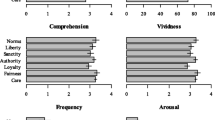Abstract
Recent evidence suggests that if a deterministic description of the events leading up to a morally questionable action is couched in mechanistic, reductionistic, concrete and/or emotionally salient terms, people are more inclined toward compatibilism than when those descriptions use non-mechanistic, non-reductionistic, abstract and/or emotionally neutral terms. To explain these results, it has been suggested that descriptions of the first kind are processed by a concrete cognitive system, while those of the second kind are processed by an abstract cognitive system. The current paper reports the results of three studies exploring whether or not considerations about possible future consequences of holding an agent responsible at a present time affect people’s judgments of responsibility. The results obtained suggest first that the concrete system does not produce compatibilist judgments of responsibility unconditionally, even when facing appropriately mechanistic, reductionistic, emotionally loaded and concretely worded deterministic scenarios. Second, these results suggest that considerations about possible future consequences for innocent third parties that may follow as a result of holding an agent responsible affect people’s judgment as to whether or not the agent is responsible for what she did. Finally, it is proposed that these results compliment extant evidence on the so-called “Side-effect effect”, as they suggest that emotional reactions toward possible future side effects influence people’s judgment of responsibility. The impact of these results for philosophy and moral psychology is discussed.

Similar content being viewed by others
Notes
To avoid excessive verbiage throughout the paper, whenever we refer to the consequences of holding an agent responsible, we mean holding an agent responsible at the present time.
This study was initially conducted using the same wording for the Worse condition as in the previous two vignettes, so the last line read “Unfortunately, during that time, they would be living with Social Services, in what might be a much worse environment for them”. This study, however, did not yield a significant effect (p = .08) with an equivalent number of participants. Although the non-significant result in this first study could have been a power issue, we decided to conduct the study anew changing the wording of the Worse condition, so instead of “Social Services” it read, as shown above, “alcoholic father”. This variation allows us to verify that the effect translates into other possible future negative consequences.
We thank an anonymous reviewer for pointing out these potential confounds.
References
Beebe, J., and W. Buckwalter. 2010. The epistemic side-effect effect. Mind & Language 25(4): 474–498.
Björnsoon, G., and Persson, K. In press. A unified empirical account of responsibility judgments. Philosophy and Phenomenological Research. doi:10.1111/j.1933-1592.2012.00603.x
De Brigard, F., E. Mandelbaum, and D. Ripley. 2009. Responsibility and the brain sciences. Ethical Theory and Moral Practice 12(5): 511–524.
Feltz, A. 2007. The knobe effect: A brief overview. Journal of Mind and Behavior 28: 265–277.
Fischer, J.M. 1994. The metaphysics of free will. Oxford: Blackwell Publishers.
Greene, J. D. 2007. The secret joke of Kant’s soul. In Moral psychology, Vol. 3: The neuroscience of morality: Emotion, disease, and development, ed. W. Sinnott-Armstrong. Cambridge, MA: MIT Press.
Greene, J.D., and J.D. Cohen. 2004. For the law, neuroscience changes nothing and everything. Philosophical Transactions of the Royal Society B 359: 1775–17785. Special Issue on Law and the Brain.
Kane, R. 1996. The significance of free will. New York: Oxford University Press.
Knobe, J. 2003. Intentional action and side effects in ordinary language. Analysis 63(3): 190–194.
Knobe, J. 2005. Cognitive processes shaped by the impulse to blame. Brooklyn Law Review 71: 929–937.
Knobe, J., W. Buckwalter, P. Robbins, H. Sarkissian, T. Sommers, and S. Nichols. 2011. Experimental philosophy. Annual Review of Psychology 63(50): 72–73.
Nadelhoffer, T. 2006. Bad acts, blameworthy agents, and intentional actions: Some problems for jury impartiality. Philosophical Explorations 9(2): 203–220.
Nahmias, E.A., S.G. Morris, T. Nadelhoffer, and J. Turner. 2005. Surveying freedom: Folk intuitions about free will and moral responsibility. Philosophical Psychology 18(5): 561–584.
Nahmias, E., S.G. Morris, T. Nadelhoffer, and J. Turner. 2006. Is incompatibilism intuitive? Philosophy and Phenomenological Research 73(1): 28–53.
Nahmias, E., D.J. Coates, and T. Kvaran. 2007. Free will, moral responsibility, and mechanism: Experiments on folk intuitions. Midwest Studies in Philosophy V. XXXI: 214–242.
Nichols, S. 2011. Experimental philosophy and the problem of free will. Science 331: 1401–1403.
Nichols, S., and J. Knobe. 2007. Moral responsibility and determinism: The cognitive science of folk intuitions. Nous XLI(4): 663–685.
Pereboom, D. 2001. Living without free will. Cambridge: Cambridge University Press.
Roskies, A., and S. Nichols. 2008. Bringing responsibility down to earth. Journal of Philosophy CV(7): 371–388.
Sarkissian, H., A. Chatterjee, F. De Brigard, J. Knobe, S. Nichols, and S. Sirker. 2010. Is belief in free will a cultural universal? Mind & Language 25(3): 346–358.
Sinnott-Armstrong, W. 2008. Abstract + Concrete = Paradox. In Experimental philosophy, ed. J. Knobe and S. Nichols, 209–230. New York: Oxford University Press.
Woolfolk, R.L., J.M. Doris, and J.M. Darley. 2006. Identification, situational constraint, and social cognition: Studies in the attribution of moral responsibility. Cognition 100: 283–301.
Author information
Authors and Affiliations
Corresponding author
Rights and permissions
About this article
Cite this article
De Brigard, F., Brady, W.J. The Effect of What We Think may Happen on our Judgments of Responsibility. Rev.Phil.Psych. 4, 259–269 (2013). https://doi.org/10.1007/s13164-013-0133-8
Published:
Issue Date:
DOI: https://doi.org/10.1007/s13164-013-0133-8




